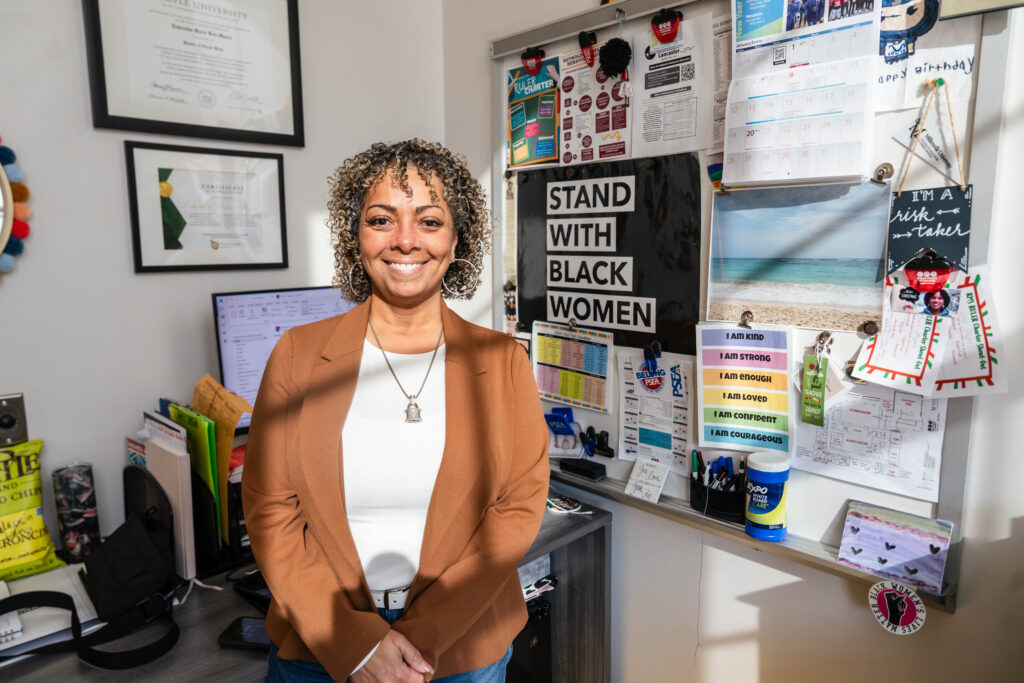
Each February, the School District of Lancaster joins the nation in celebrating Black History Month—a time to honor the past, uplift the present, and build a more equitable future. As we reflect on the contributions of Black leaders and changemakers, we recognize the Black educators and staff whose commitment to our students shapes the next generation.
One such leader is Lakeesha Bair-Myers, a social worker at Reynolds Middle School. Lakeesha is not just an advocate. She is a force for change, a mentor, and a role model. As a proud SDoL alum, she has returned to the same schools that shaped her, bringing a deep sense of purpose and commitment to her students. Her story is one of resilience, representation, and the power of education—a story that embodies the very essence of Black excellence.
Lakeesha’s journey in SDoL began as a student, where she spent her entire K-12 education where she walked the same hallways, sat in the same classrooms, and discovered the power of education in shaping her future. Enrolled in Advanced Placement courses (now known as IB classes) and actively engaged in school activities, she was guided by dedicated educators who encouraged her curiosity and growth.
“SDoL prepared me for success. My teachers invested in me, pushing me to think bigger. It only made sense to return to the same community that shaped me and give back.”
That foundation set her on a path of success, but her journey to social work wasn’t immediate. She began her career as a juvenile probation officer, where she witnessed firsthand the systemic failures affecting young people—particularly those of color.
While working in probation, she realized she was already doing social work—advocating for youth, mentoring them, and helping them navigate challenges—just without the official title. Recognizing that she needed deeper knowledge and research-based strategies to make a lasting impact, she pursued both her Bachelors in Criminology at Millersville University and Master’s in Social Work at Temple University. When the opportunity to return to SDoL arose, she knew this was where she was meant to be—helping students before they ever reached the juvenile system.
Black History Month: A Personal Reflection
For Lakeesha, Black History Month is more than a commemoration—it is a call to action. It is a time to honor the resilience of those who paved the way while recognizing the work that remains. She sees herself as the embodiment of her ancestors’ hopes, occupying a space they may never have envisioned for a Black woman. This understanding fuels her passion to uplift students, ensuring they recognize their own strength, value, and potential to shape the future.
“This month is the one time of year where I feel like I have more flexibility to celebrate my culture openly. But at the same time, I find myself frustrated—why am I still learning things about Black history at 51 years old? Why do we only get this focus in February?”
In her family, Black History Month is marked by traditions both cultural and educational. One cherished practice is cooking black-eyed peas and collard greens, a tradition rooted in Black heritage.
“Black-eyed peas symbolize luck, and collard greens represent money. We usually eat them on New Year’s, but now we’ve made it a point to eat them during Black History Month as well, as a way to bring wealth, happiness, and good health into our lives.”
Beyond her family traditions, Lakeesha is actively involved in community organizations that uplift Black students. She serves on the board of the Martin Luther King Jr. Scholarship, helping to award scholarships to graduating SDoL seniors.
“Our scholarship application process encourages students to look beyond the ‘I Have a Dream’ speech. We want them to dig deeper into Dr. King’s legacy—his activism, his strategies for change, and his impact beyond that one famous speech.”
Her mother, Jackie Book, played a crucial role in shaping this perspective. She instilled in Lakeesha the importance of never allowing others to silence her—a lesson she carries into her work every day. Lakeesha ensures her students, especially those who feel marginalized, understand that their voices matter.
“My mother always said, ‘Never let anyone silence you.’ She had experienced being overlooked and unheard, and she made sure I would never accept that for myself. That lesson drives everything I do.”
Lakeesha takes this lesson into her work, ensuring that every student—especially those who feel marginalized—understands the power of their voice. Education, she reminds them, is a tool of empowerment, one that was historically denied to Black communities precisely because it grants independence and strength.
“Education was historically denied to us because knowledge is power. I tell my students: Use your education. Take every opportunity. Never let anyone tell you that you don’t belong in these spaces.”
Resilience, Joy, and the Power of Connection
One of Lakeesha’s most powerful experiences in recent years was reconnecting with a long-lost brother—one who, until adulthood, never even knew he was Black.
“He was adopted and raised by a white and Latino family. His birthday was June 19th—Juneteenth. And here he was, never having known his own history, his own identity. Meeting him was a moment of resilience and joy, a reminder of how important it is for us to reclaim our stories and understand our past.”
That personal experience mirrors what she teaches her students: to embrace their history, their identity, and their power.
The Power of Representation in Schools
Lakeesha knows that representation is not just about being present—it’s about making an impact. Growing up, she rarely saw teachers who looked like her. Now, as an educator herself, she is determined to show students that leadership roles are within their reach.
“When I was in school, there weren’t many teachers who looked like me. Now, as an educator, I want students to see a Black woman in a leadership role and know that it’s possible for them too.”
She also recognizes that progress is being made within SDoL, particularly in increasing diversity in leadership. “We still have a long way to go, but I appreciate the district’s efforts to support and uplift staff of color. Representation matters. When students see teachers, counselors, and administrators who look like them, they start to believe in what’s possible for their own futures.”
For her, Black History Month is also a call to action.
“We need to keep fighting for our students. We need to keep pushing for equity in education. And we need to make sure that Black history isn’t just something we talk about in February—it’s something we uplift all year long.”
One of the ways she does this is through everyday conversations and visual cues. Wearing clothing that highlights Black historical figures sparks curiosity among students, giving her the opportunity to introduce them to influential figures like Maya Angelou, Malcolm X, and Dr. King. Similarly, she makes a point to wear HBCU (Historically Black Colleges & Universities) apparel on College & Career First Fridays, ensuring that students see these institutions as a viable and proud path for their futures.
Beyond representation, she fosters a safe space for Black students who may struggle to feel seen. Many hesitate to bring their full selves into the classroom, fearing judgment or misunderstanding. Lakeesha is intentional about letting them know they have an ally, someone who understands their experiences and will fight for their success.
Mentoring the Next Generation of Social Workers
Lakeesha’s impact extends beyond students—she is also shaping the future of social work. As a mentor to graduate-level social work students from Millersville University, she is dedicated to building a new generation of professionals who are not only well-trained but deeply committed to equity and justice. Her influence has already come full circle, with many of her former interns now working within SDoL, continuing the advocacy and support she has championed.
Her contributions were recognized when she was nominated for Field Instructor of the Year, an acknowledgment of her dedication to mentoring aspiring social workers. Among those she has guided is one of her former interns, a past SDoL student whom she mentored while pursuing her Master’s in Social Work. Seeing this student return to the district as a professional is a full-circle moment that reinforces the power of mentorship and representation in education. For her, this work is about ensuring that those who follow in her footsteps are prepared to continue the fight for social justice and student advocacy.
A Living Legacy
Lakeesha Bair-Myers is Black history in action. Her story is a proof of the transformative power of education, advocacy, and representation. The work she does today shapes the lives of students, social workers, and the broader community, ensuring that Black history is not just a lesson in February but an ongoing legacy of empowerment and change.Through her passion and commitment, she reminds us that the movement forward is continuous.
She is resilience. She is representation. She is change.
And through her work, she ensures that Black history is not just remembered in February—but honored every single day.
Join Us in Celebrating Black History Month
Throughout February, we will highlight Black educators, staff, and students whose contributions inspire and empower. Let’s celebrate Black excellence—today and every day.
